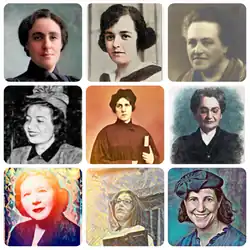Rabbi
Rabbi (in the Hebrew classic רִבִּי ribbi; in the Hebrew modern רַבִּי rabbi) in Judaism can mean "professor, master" or literally "grand". The word "Rabbi" ("My Master") derives from the Hebrew root "Rav", that in Biblical Hebrew signifies "grand" or "respected" (in knowledge).
| Part of a series on | |||
|---|---|---|---|
| |||
| Judaism | |||
| Category | |||
| Jewish religious movements | |||
|
Reconstructionist • Renewal • Humanistic | |||
| Jewish philosophy | |||
| Religious texts | |||
| Religious Law | |||
|
Mishneh Torah • Tur | |||
|
Shulchan Aruch • Mishnah Berurah | |||
|
Kashrut • Tzniut • Tzedakah • Niddah • Noahide laws | |||
| Holy cities | |||
| Important figures | |||
| Rabbinic sages | |||
| Jewish life cycle | |||
|
Marriage • Bereavement | |||
| Religious roles | |||
|
Rabbi • Rebbe • Posek • Hazzan/Cantor | |||
|
Dayan • Rosh yeshiva • Mohel • Kohen/Priest | |||
| Religious buildings & institutions | |||
|
Sukkah • Chevra kadisha | |||
| Jewish education | |||
| Religious articles | |||
|
Mezuzah • Hanukiah/Menorah • Shofar | |||
|
4 Species • Kittel • Gartel | |||
| Jewish prayers and services | |||
|
Birkat Hamazon • Shehecheyanu • Hallel | |||
|
Havdalah • Tachanun • Kol Nidre • Selichot | |||
| Judaism & other religions | |||
| Abrahamic faiths | |||
| Related topics | |||
|
Jewish culture • [[]] • Israel • | |||


In Judaism, most rabbis earn their title by studying halakha at a seminary or yeshiva. The primary role of a rabbi is to teach Torah. In addition, rabbis often act as the religious leader of a Jewish community. In contrast to many other religions, a rabbi is not required to be present at life cycle events in Judaism. Nevertheless, rabbis still normally preside over life cycle events in order to ensure that it is done according to Halakha.
"Rabbi" is sometimes used as a title of respect for members of a Jewish community.
Historically, only men were rabbis. Since the 1970s and 1980s, most Jewish communities began to accept women as rabbis. However, most Orthodox Jewish communities do not accept this change.
Three rabbis together can form a rabbinic court, or beit din. This is done when there is a legal conflict between two Jews. They judge the conflict based on halakha. A beit din is also formed for somebody who wants to convert to Judaism.
Rabbis are also sometimes asked to supervise food preparation to make sure it is kosher. When packaged food is supervised, the packaging is often labeled with a hechsher. A hechsher is a symbol which means that the content of the package is kosher.

